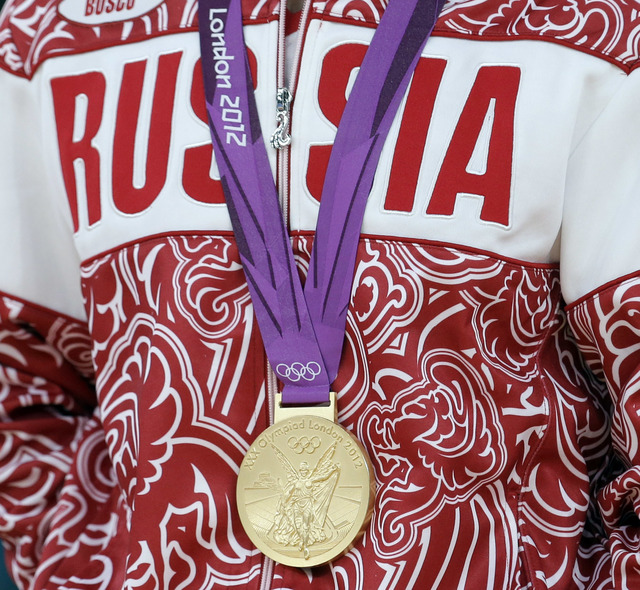LAUSANNE, Switzerland — Olympic leaders stopped short Sunday of imposing a complete ban on Russia from the Rio de Janeiro Games, leaving individual global sports federations to decide which athletes should be cleared to compete. ADVERTISING LAUSANNE, Switzerland — Olympic
LAUSANNE, Switzerland — Olympic leaders stopped short Sunday of imposing a complete ban on Russia from the Rio de Janeiro Games, leaving individual global sports federations to decide which athletes should be cleared to compete.
The decision, announced after a three-hour meeting of the International Olympic Committee’s executive board, came just 12 days before the Aug. 5 opening of the games.
“We had to balance the collective responsibility and the individual justice to which every human being and athlete is entitled to,” IOC President Thomas Bach said.
The IOC rejected calls from the World Anti-Doping Agency and many other anti-doping bodies to exclude the entire Russian Olympic team following allegations of state-sponsored cheating.
Russia’s track and field athletes have already been banned by the IAAF, the sport’s governing body, a decision that was upheld Thursday by the Court of Arbitration for Sport, and was accepted by the IOC again on Sunday.
Calls for a complete ban on Russia intensified after Richard McLaren, a Canadian lawyer commissioned by WADA, issued a report Monday accusing Russia’s sports ministry of overseeing a vast doping program of its Olympic athletes.
McLaren’s investigation, based heavily on evidence from former Moscow doping lab director Grigory Rodchenkov, affirmed allegations of brazen manipulation of Russian urine samples at the 2014 Winter Games in Sochi, but also found that state-backed doping had involved 28 summer and winter sports from 2011 to 2015.
But the IOC board, meeting via teleconference, decided against the ultimate sanction, in line with Bach’s recent statements stressing the need to take individual justice into account.
“An athlete should not suffer and should not be sanctioned for a system in which he was not implicated,” Bach told reporters on a conference call after Sunday’s meeting.
Back acknowledged the decision “might not please everybody.”
“This is not about expectations,” he said. “This is about doing justice to clean athletes all over the world.”
Olympic Village unfit for athletes
RIO DE JANEIRO – Australian athletes will not move into their rooms at the Rio de Janeiro Olympics until serious plumbing, electrical and cleaning problems are fixed, with the troubled South American games opening in under two weeks.
Kitty Chiller, the head of the Australian delegation, said in a statement Sunday that team members “will not move into our allocated building” at the Athletes Village. She gave no hint of when they might. Teams from Britain and New Zealand were also reported to be having similar problems.
This comes as the sprawling 31-building village, which will house 18,000 athletes and officials at the height of the games, opened officially on Sunday with some athletes expected to arrive.
This is the latest problem for the troubled games, which have been hit by the Zika virus, water pollution and severe budget cuts.
The International Olympic Committee and local organizers held emergency talks Sunday, but did not reply immediately to emails from The Associated Press.
“We’re having plumbing problems, we’ve got leaking pipes,” Mike Tancred, the spokesman for the Australian team, said in an interview with AP. “We’ve got electrical problems. We’ve got cleaning problems. We’ve got lighting problems in some of the stairwells.”
He said more than 20 staff members have been unable to stay in the building, and said the first Australian athletes were to arrive today.
“We did a stress test on Saturday, turned on the taps and flushed the toilets, and water came flooding down the walls,” Tancred said.
Chiller listed the same problems, and added more.
“Water came down walls, there was a strong smell of gas in some apartments and there was ‘shorting’ in the electrical wiring,” she said. “We have been living in nearby hotels because the village is simply not safe or ready.”
She said teams from Britain and New Zealand had similar problems, which have been going on for at least a week.
The United States Olympic Committee acknowledged there were small problems.
“As is the case with every Games, we’re working with the local organizers to address minor issues and make sure the village is ready for team USA athletes,” spokesman Patrick Sandusky told AP.
Local reports said about 5 percent of the apartments had gas, water and electrical faults, and some were without toilet fixtures.
Scott Field, spokesman for the British team, declined to comment but acknowledged problems were being tackled.
Chiller said the IOC will ask local organizers to do stress tests “throughout the Olympic Village,” a process that could force major delays and require people living there now to relocate.
The 31-building compound contains tennis courts, soccer fields, seven swimming pools — with mountains and the sea as a backdrop — topped off by a massive dining-kitchen compound that’s as large as three football fields.
The 3,600 apartments are to be sold after the Olympics with some prices reaching $700,000. The development costs about $1.5 billion, built by the Brazilian billionaire Carlos Carvalho.
“From the exterior it looks like the Hilton Hotel,” Tancred said. “But inside it’s not finished.”



